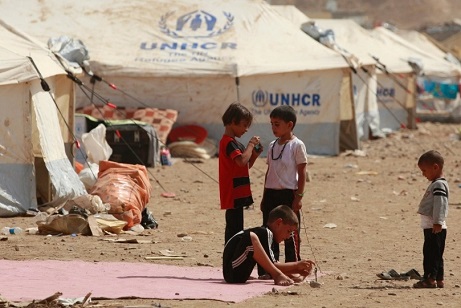Georgia supports 361 ISIS victims, says Refugee Ministry

Georgia has helped hundreds of asylum seekers from Syria and Iraq, who have escaped the violent regime of the Islamic State of Iraq and Syria (ISIS), Georgian officials say.
The head of the Migration, Repatriation and Refugee Issues Departments of the Refugee Ministry, Irakli Kokaia, said from 2012 until now, Georgia has supported 361 ISIS victims from Iraq and Syria.
Specifically, 217 people from Iraq had been granted humanitarian status and 77 people had been granted refugee status.
Since 2012, 2,114 people from Iraq addressed Georgia for asylum, out of which 1,474 applicants left Georgia while their applications were being reviewed.
Currently 335 persons are registered in Georgia as asylum seekers and 333 people were refused.
As for Syrian refugees, 167 people addressed Georgia for asylum. Of this number 62 were granted humanitarian status and five were given refugee status. Currently 31 cases are being reviewed, 51 cases have been stopped because these people left the country and 18 applications were refused.
Kokaia noted most people were refused in the initial stage of the flow, and the reason for this was because at the time these people had the possibility of safely moving to another city or place to live within their own countries. However, as the situation got more intense over time, Georgia was now ready to assist victims of the ISIS regime who were already on Georgian soil and had applied for refugee or humanitarian status.
In the initial stage in 2012, the reason for refusal was that the hostilities did not take place on the whole territory of Iraq. The people who arrived here and asked for asylum had the alternative of movement in their country,” said Kokaia.
"If we use the example of Ukraine, there is a war in Donbas but not in Kiev. The same was in Iraq. They could have relocated within their country. However, later the situation got worse and ISIS covered almost the whole of Iraq. Therefore, we cannot refuse these people with the same reason now, and in fact, now we grant 95 percent of people a [humanitarian or refugee] status, which is a very high indicator,” Kokaia noted.
He also stressed another main reason why Georgia refused to grant humanitarian or refugee status to some applicants was to ensure the country’s security.
"If a person fought in an informal military unit, was suspected of torturing or more, we do not grant them a status,” he said.
 Tweet
Tweet  Share
Share